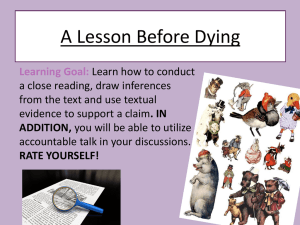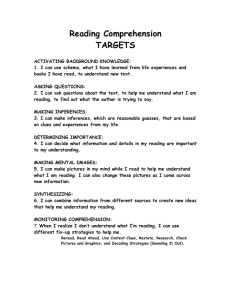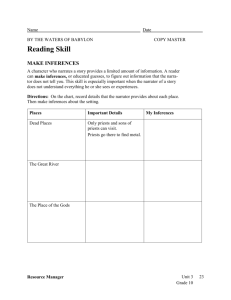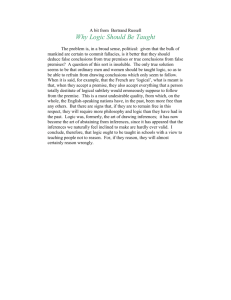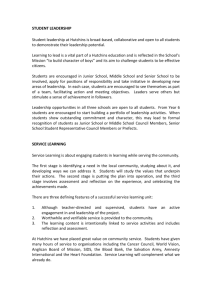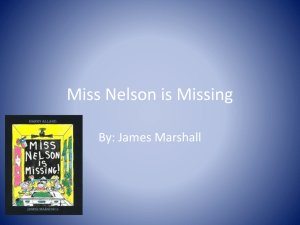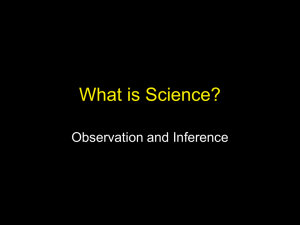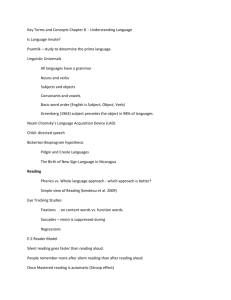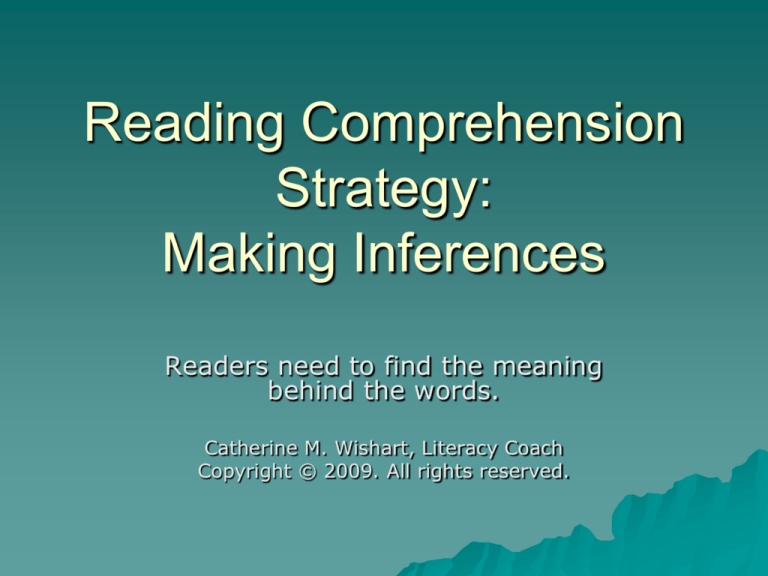
Reading Comprehension
Strategy:
Making Inferences
Readers need to find the meaning
behind the words.
Catherine M. Wishart, Literacy Coach
Copyright © 2009. All rights reserved.
What Are Inferences?
Inferences are often referred to as what
you “read between the lines.”
The meaning is really found “between
your ears.”
Inferences are what the author implies or
suggests.
The author wants you, the reader, to
make the jump to the same conclusion the
author has made.
When the author implies something, the
reader has to infer.
(Zimmermann and Hutchins, 2003, p. 97).
What Happens When You Read?
While
you read, your inside voice:
– Makes guesses
– Finds connecting points
– Asks questions
– Makes predictions
– Personalizes the reading
– Uses background knowledge to interpret
Zimmerman and Hutchins, 2003, p. 97.
The Game of Clue
The game of Clue is an inference game.
You are never told who killed Mr. Boddy,
but you may be told who did not kill him.
You gather clues so you can infer who
really killed Mr. Boddy.
All mystery shows are based on inference:
–
–
–
–
–
Murder, She Wrote
CSI
NCIS
Law and Order
Scooby Doo
Let’s Play Clue!
Based on the following clues, decide:
– Who killed Mr. Boddy
– Where Mr. Boddy was killed
– With what weapon Mr. Boddy was killed
The usual suspects are: Mrs. Peacock,
Colonel Mustard, Miss Scarlet, Mr. Green,
Mrs. White, and Professor Plum
The rooms are: the kitchen, the ballroom,
the library, the study, the conservatory,
and the game room
The weapons are: the candlestick, the
knife, the revolver, the rope, the wrench,
and the lead pipe
The Rules
You have each been given one card.
Whatever is on your card was not involved
in killing Mr. Boddy.
You each will be able to ask one classmate
to reveal his or her card to the entire class.
You may make a guess at any time.
Your guess must include all three: the
murderer, the weapon, and the room.
Once you guess, you cannot guess again.
Let’s Begin
The Solution Is…
So, How Did You Infer The
Solution?
You
used background knowledge:
– You knew who the suspects were
– You knew the rooms involved
– You knew the possible weapons
You
asked questions of classmates
You made predictions based on
changing information
– Your predictions changed as you
continued to gain information
When Do We Infer?
We
infer all the time.
“Feeling empathy for characters,
laughing at a joke, discovering an
answer to a riddle, getting a sense
about the setting of a story, reacting
to facts, and solving a mystery are
all part of inferential thinking.”
(Zimmerman and Hutchins, 2003, p. 115).
A Simple Inference
If
the skies suddenly grow very
cloudy and the wind begins to whip
around your legs, how do you infer?
– You have seen this weather pattern
before.
– You have background knowledge about
storms.
– You make connections between your
background knowledge and the current
weather pattern.
– Based on these connections, you make
a prediction.
Let’s Use Background Knowledge
Even couples with only mild difficulties in
communicating can have important
misunderstandings. Marjorie, for example, wanted
Ken to invite her to a favorite cocktail lounge
overlooking a bay to celebrate their anniversary.
She archly asked him, “Ken, do you feel like going
out for a drink tonight?” Ken, who was feeling
tired, missed the hidden message contained in her
question. He responded, “No, I’m too tired.”
Marjorie was extremely disappointed. Only after
feeling hurt and sorry for herself did she realize
that she had not communicated to Ken her real
desire – to celebrate their anniversary. When she
later made clear her true wish, he readily agreed
to celebrate.
Beck, Love is Never Enough
What Can You Infer?
Which of the assumptions listed below can be inferred from the text?
Marjorie and Ken are probably married?
Marjorie and Ken have been married for a
long time?
Ken does not enjoy going out for drinks
with his wife?
If Marjorie had expressed her wish more
clearly, Ken would have probably agreed?
All couples can have communication
problems?
You Used Your Background
Knowledge
Married
couples have anniversaries.
Couples married both a short time
and a long time have anniversaries.
Married couples you know have had
misunderstandings and hurt feelings.
You Used Hints in the Text and
Asked Yourself Questions
Ken “readily agreed” is a clue. You asked
yourself, “Does this mean he didn’t
understand at first?”
“No, I’m too tired,” is a clue. You made a
connection to this statement and
Marjorie’s hurt feelings.
“For example” is a clue that a story is
coming. You could predict that the author
was going to give a specific example, or
story, to illustrate the point.
Let’s Look At Another Story
Boori Ma, sweeper of the stairwell, had not slept in two
nights. So the morning before the third night she shook the
mites out of her bedding. She shook the quilts once underneath
the letter boxes where she lived, then once again at the mouth
of the alley, causing the crows who were feeding on vegetable
peels to scatter in several directions.
As she started up the four flights to the roof, Boori Ma
kept one hand placed over the knee that swelled at the start of
every rainy season. That meant that her bucket, quilts, and the
bundle of reeds which served as her broom all had to be braced
under one arm. Lately Boori Ma had been thinking that the
stairs were getting steeper; climbing them felt more like
climbing a ladder than a staircase. She was sixty-four years old,
with hair in a knot no larger than a walnut, and she looked
almost as narrow from the front as she did from the side.
Lahiri, Interpreter of Maladies, as printed in Zimmerman and Hutchins, 2003, pp. 95-96.
Questions And Observations You
Can Make About This Passage
Why hasn’t Boori Ma slept in two nights?
Why doesn’t she wash her bedding to get rid of the
mites?
Why is she so thin?
Why does she have such as formal title – “sweeper
of the stairwell”?
How long has she been doing this?
Your background knowledge tells you that she is
very poor (her living conditions).
Your background knowledge may also tell you how
it feels to be infested by pests like mites or lice
What will happen to this woman?
Zimmerman and Hutchins, 2003, pp. 96-97.
Guiding Questions To Help With
Inferences
The author gave me a gift in the title.
What prediction popped into my head
from it? How does it help me?
Now that I’ve almost finished this
passage, can I confirm my predictions?
What message do I think the writer wants
me to understand? How will this help me
remember the reading?
What words helped me reach my
conclusions?
How can I explain my inference to
somebody else?
Zimmerman and Hutchins, 2003, pp. 116-117
Mr. Perfect
The minister asked for anyone who knew a
truly perfect person to stand up. After a long
pause, a meek-looking fellow in the back stood.
“Do you really know a perfect person?” he was
asked.
“Yes, Sir, I do,” answered the little man.
“Would you please tell the congregation who
this rare, perfect person is?” pursued the
preacher.
“Yes, Sir, my wife’s first husband.”
Bonham, The Treasury of Clean Jokes
Questions and Observations for
“Mr. Perfect”
How did the title help you?
Did your prediction of who the perfect
person was hold true?
What message is the author conveying?
How did your background knowledge help
you interpret the message?
What do you think the little man’s wife
does to him at home?
Why did the author decide to make the
man “little”?
How can you explain your inferences to
somebody else?
What Statements Can be Logically
Inferred?
1.
2.
3.
4.
5.
The minister is surprised when the man
stands up.
The minister is doubtful that the man
really knows a perfect person.
The man believes that his wife’s first
husband is perfect.
The wife believes that her first husband
is perfect.
The man’s wife has been comparing him
unfavorably with her first husband.
The Rallying Power of Recorded Music
Released in 1984, “We Are the World” right away was the fastestclimbing record of the decade. 4 million copies were sold within
six weeks. Profits from the record, produced by big-name
entertainers who volunteered, went to the USA for Africa project.
The marketplace success paled, however, next to the social
impact. The record’s message of the oneness of humankind
inspired one of the most massive outpouring of donations to date.
Americans pumped $20 million into USA for Africa in the first six
weeks the record was out. Within months, $50 million in medical
and financial support was en route to drought-stricken parts of
Africa. “We Are the World,” a single song, directly saved lives.
The power of recorded music is not a recent phenomenon. In
World War I, “Over There” and other records reflected an
enthusiasm for American involvement in the war. Composers who
felt strongly about the Vietnam War wrote songs put their views
on vinyl. “The Ballad of the Green Berets” cast American soldiers
in a heroic vein, “An Okie from Muskogee” glorified blind
patriotism, and there were antiwar songs, dozens of them.
Vivan, The Media
Internal Questions
What
does the title tell me?
What background knowledge can I
draw on to understand this passage?
What message does the author want
me to understand?
What words helped me reach these
conclusions?
How can I explain these inferences to
somebody else?
What Can We Correctly Infer?
1.
2.
3.
4.
5.
“We Are the World” was the best-selling
song of all time.
“We Are the World” would not have been
a popular song if the profits had not
gone to a charitable cause.
Americans would not have contributed as
much to USA for Africa had “We Are the
World” not been recorded.
“Over There” was a patriotic song,
supporting US involvement in WW I.
During the Vietnam War, patriotic songs
were more popular than antiwar songs.
Practicing This Strategy
The
short story, “The Puzzle,” is
continued on the next slide.
Read this portion of the story
carefully. You may also decide to
review previous portions of the story
to assure you recall the highlights of
the characters and the plot.
“The Puzzle” by Anonymous
“Pugh, what I hear is the reverberation of some machinery.”
“Do you think so?”
“I’m sure of it.”
“What have you done?”
“Broken something, I fancy.” He listened intently, with his ear to the box. “No – it seems all
right. And yet I could have sworn I had damaged something; I heard it smash.”
“Give me the box.” He gave it to me. In my turn, I listened. I shook the box. Pugh must have
been mistaken. Nothing rattled; there was no wound; the box was as empty as before. I gave
a smart tap with the hammer, as Pugh had done. Then there certainly was a curious sound. To
my ear, it sounded like the smashing of glass. “I wonder if there is anything fragile inside your
precious puzzle, Pugh, and, if so, if we are shivering it by degrees?”
II
“What IS that noise?”
I lay in bed in that curious condition which is between sleep and waking. When, at last, I KNEW
that I was awake, I asked myself what it was that had woke me. Suddenly I became conscious
that something was making itself audible in the silence of the night. For some seconds I lay
and listened. Then I sat up in bed.
“What IS that noise?”
It was like the tick, tick of some large and unusually clear-toned clock. It might have been a
clock, had it not been that the sound was varied, every half dozen ticks or so, by a sort of
stifled screech, such as might have been uttered by some small creature in an extremity of
anguish. I struck a light. The sound seemed to come from the neighborhood of my dressingtable. I went to the dressing-table, the lighted match in my hand, and, as I did so, my eyes fell
upon Pugh’s mysterious box. That same instant there issued, from the bowels of the box, a
more uncomfortable screech than any I had previously heard. It took me so completely by
surprise that I let the match fall from my hand to the floor. The room was in darkness. I stood,
I will not say trembling, listening – considering their volume – to the EERIEST shrieks I ever
heard. All at once they ceased. Then came the tick, tick, tick again. I struck another match and
lit the gas.
What Inferences Can You
Make?
Reread this portion of “The Puzzle” to
yourself.
Think about the inferences you have made
about parts of the story.
Complete the double-entry journal page.
Choose your own quotes from the story on
which to make inferences.
Be prepared to discuss your connections
with this part of the story in class.
So, When We Infer, We…
Make inferences based on sound
reasoning.
Use background knowledge to make
connections and personalize the reading.
Ask internal questions while reading.
Make predictions and confirm or discard
them as we continue reading.
Try to recognize the author’s purpose and
message.
Make inferences using what is “between
our ears.”
“Writers give clues, but readers
have to amass the evidence and
draw conclusions for
themselves.“
Zimmerman and Hutchins, 2003, p. 106
References
Anonymous. “The Puzzle.”
http://www.classicreader.com/book/1409/1/.
Beck, Aaron. Love is Never Enough. NY:
HarperCollins, 1988.
Bonham, Tal D. The Treasury of Clean Jokes.
Nashville, Broadman Press, 1981.
Pratt, Anthony E. Clue. NY: Parker Brothers,
1944.
Vivian, John. The Media of Mass Communications.
Boston: Allyn & Bacon, 1997.
Wintner, Gene. The Reading Quest. Boston: Allyn
and Bacon, 2000.
Zimmerman, Susan, and Hutchins, Chryse. 7
Keys to Comprehension. NY: Three Rivers Press,
2003.

